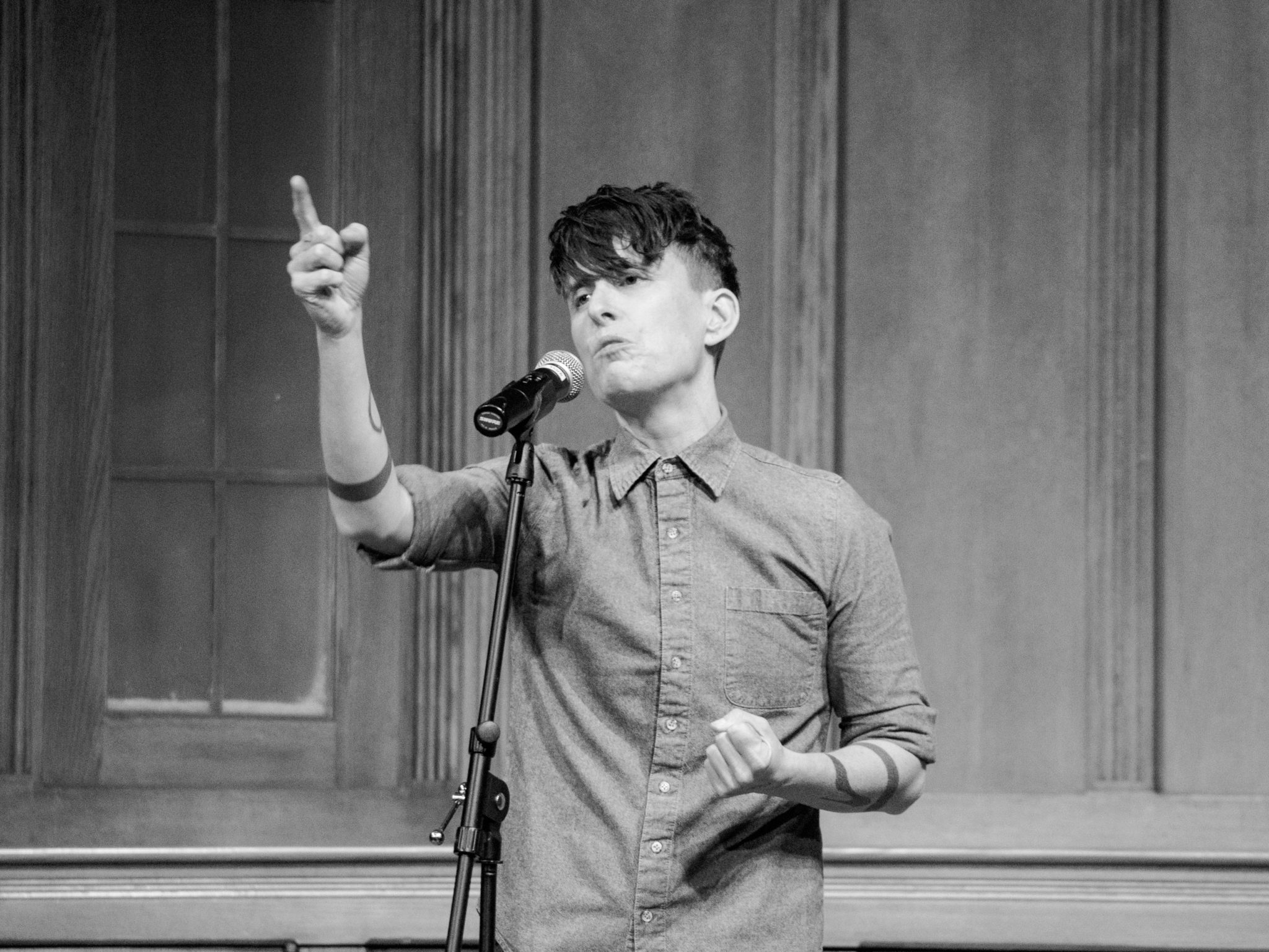
It was medicine for our hearts.
They finished a poem about Orlando, Florida, and nobody clapped because our faces were wet and our hands were stunned. Applause would have been sacrilege.
A day after the anniversary of Trump’s election, award-winning activist-poet Andrea Gibson appeared in Sudler Recital Hall on Wednesday night for an evening of spoken word. In Trump’s America — where anyone who isn’t a straight, white male doubts the security and safety of tomorrow — Gibson’s poetry reminded us that we are not alone and that we are still cared for, with works highlighting LGBTQ, feminist and mental health themes. Gibson’s first poem of the night, “Angels of the Get Through,” acknowledges that this year “has been the hardest of your whole life.”
Even though progress has been made, especially with the legalization of gay marriage in 2015, it’s still an incredibly difficult and complex experience for any LGBTQ person living in America. From adolescents grappling with sexual confusion and familial acceptance to the sometimes-violent societal tensions surrounding LGBTQ issues, the heartbreak and discrimination this community faces are interwoven into our daily American politics. In fact, Gibson’s poem about last year’s Orlando shooting, which resulted in the deaths of 49 people at the gay nightclub Pulse, demonstrates a terrifying lack of security for people who identify as LGBTQ. When the first responders entered the club, they asked anyone alive to raise their hand; Gibson says in their poem, “Orlando,” “I imagined at that exact moment my hand twitched in my sleep.”
It is a powerful mode to what the entire American LGBTQ population and its supporters suffered in the aftermath of the massacre. Gibson spins scene upon scene, from an innocent club member shouting, “This is my favorite song,” to a victim texting, “Mommy, I’m gonna die.” Gibson responds that “half of us [are] already dead to our families before we die,” in reference to the collective alienation that the LGBTQ endure on a day-to-day basis.
Though “Orlando” brought silence and tears, Gibson’s delivery highlighted that we are connected in this struggle through the shared emotions we so intensely feel and the injustices we are always fighting against.
Even their more personal poems, like “Photoshopping My Sister’s Mugshot,” which is about watching their younger sister become addicted to heroin, resonate with broader issues of losing our youth and naivety too quickly in America. Whether it’s through drug abuse, depression or bullying, Gibson tackles these private sufferings in our American experience, when we eventually shed our idyllic childhood. All the social issues they attack tie directly to the pain of growing up.
Their Wednesday performance also asks us how old children should be before learning about the ugly parts of society. Gibson recalls delivering a poem addressing white supremacy in an elementary school, and a 5-year-old girl covered her face, whimpering, “We are so bad.” We are left to wrestle with the question of when children become old enough to inherit national guilt and when the idealistic world views must be torn away.
Because healing is not just about hope and optimism — it also requires recognizing the worst parts of society. When Gibson criticizes the objectification of women in “To The Men Catcalling My Girlfriend When I’m Walking Beside Her,” they are both humorous and caustic. Gibson’s poetry, whether lighthearted or profoundly devastating, attempts to relate their personal experiences to the simultaneous national traumas — whether they are gender, racial or sexual traumas — by pinpointing the causes of suffering.
Though their poetry drew upon the buried and concealed pain of audience members attuned to recent tragedies, the outburst of emotion was necessary. As a break from our normally hectic college lives, we needed to know that all of us are suffering, working and striving toward a better America. We needed to know that though we may be attacked for our skin color, our body or our sexualities, listening to their poetry together makes us — at least for a moment — united.
Allison Chen | allison.chen@yale.edu .







